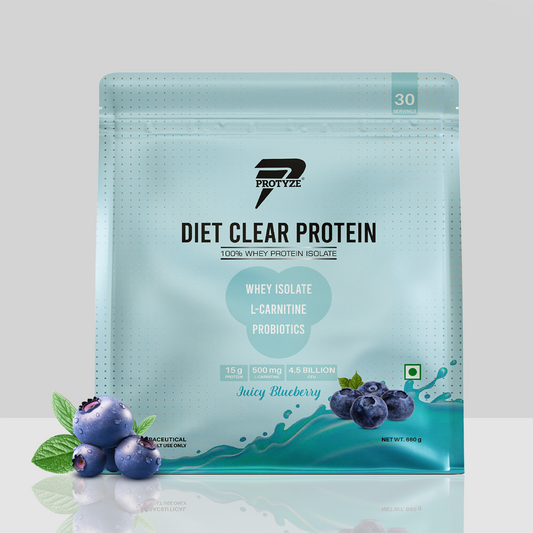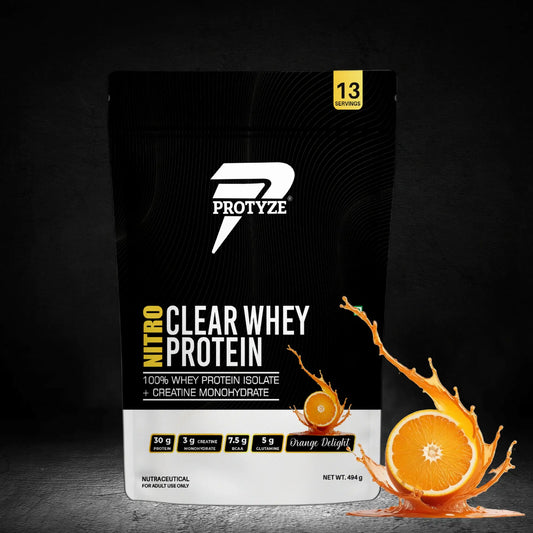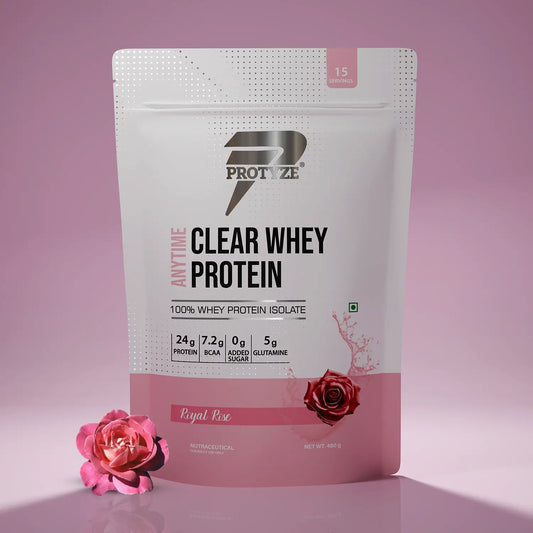The fitness supplement industry is constantly evolving, and one trend gaining attention is the addition of probiotics to protein supplements. Probiotics, the beneficial bacteria that support gut health, are now being blended with protein powders to potentially enhance digestion, recovery, and overall wellness. But is this combination a genuine breakthrough or just a marketing ploy?
This blog explores whether probiotics in protein supplements deliver real benefits or are merely a passing fad, tailored for Indian fitness enthusiasts with science-backed insights and cultural context. We’ll reference Protyze Diet Clear Whey, a probiotic-enhanced protein, sparingly to illustrate key points, and provide a balanced view to help you make informed choices.
What Are Probiotics in Protein Supplements?
Probiotics are live microorganisms, such as Lactobacillus and Bifidobacterium, that promote a healthy gut microbiome when consumed in sufficient quantities, per a 2018 study. They’re naturally found in fermented foods like curd and are now incorporated into some protein powders.
Protein supplements, typically whey-based, supply amino acids for muscle repair, growth, and recovery. The idea behind combining probiotics with protein is to improve digestion, nutrient absorption, and fitness outcomes by supporting gut health. In India, where lactose sensitivity affects ~60% of the population and humid climates can strain digestion, this trend holds appeal. Let’s examine the science, benefits, limitations, and whether the hype matches reality.
The Science Behind the Combination
Probiotics balance the gut microbiome by increasing beneficial bacteria, which aid digestion, reduce inflammation, and strengthen immunity, according to a 2019 study. They produce short chain fatty acids (SCFAs), which fuel energy and stabilize blood sugar, indirectly supporting workouts. In protein supplements, probiotics may enhance protein digestion and amino acid absorption, reducing digestive discomfort.
Role of Protein
Whey protein, a complete protein with all essential amino acids, delivers 15-30g per serving to trigger muscle protein synthesis, per a 2018 study. It’s a cornerstone for muscle building, fat loss, and recovery, widely used by Indian fitness enthusiasts to supplement diets that may lack protein (e.g., vegetarian meals).
Potential Synergy
Pairing probiotics with protein could optimize fitness by ensuring efficient nutrient uptake and minimizing bloating, especially for lactose-sensitive individuals. A 2020 study suggests probiotics improve protein utilization by 10-15%, potentially enhancing recovery. However, benefits depend on the probiotic strain, dosage (e.g., 1-10 billion CFU), and whether the bacteria survive stomach acid to reach the gut.
Benefits of Probiotics in Protein Supplements
Following are the Benefits of Probiotics in Protein Supplements:
1. Improved Digestion and Comfort
Probiotics help break down lactose and proteins, easing digestion and reducing bloating, per a 2021 study showing 20% less digestive discomfort with Lactobacillus strains. This is particularly relevant in India, where lactose intolerance is common, and dairy-based proteins can cause issues.
For example, Protyze Diet Clear Whey, with 15g protein and probiotics, is 99% lactose-free, offering a gut-friendly option when mixed with water. Indian diets rich in fermented foods like curd or chaas can further support this benefit, making supplementation a convenient addition.
2. Enhanced Nutrient Absorption
A balanced gut microbiome improves the absorption of amino acids, vitamins, and minerals, per a 2019 study, potentially boosting muscle repair by 10%. This ensures you get the most from your protein intake, maximizing workout results. Combining a probiotic-enhanced protein with Indian staples like dal (~9g/100g protein) or spinach (~2 mg iron/100g) can amplify nutrient uptake, supporting fitness goals.
3. Faster Recovery and Less Inflammation
Probiotics reduce inflammation markers (e.g., C-reactive protein) by 15%, per a 2020 study, accelerating recovery and easing muscle soreness. This allows for more consistent training, crucial for progress. Adding anti-inflammatory Indian spices like turmeric to meals complements this effect, enhancing post-workout recovery.
4. Stronger Immunity and Energy
The gut houses ~70% of immune cells, and probiotics strengthen this barrier, reducing illness frequency by 20%, per a 2018 study. They also improve energy by optimizing nutrient metabolism, helping you power through workouts. In India’s urban settings, where pollution and monsoon seasons challenge immunity, this benefit is significant. Pairing supplements with fermented foods like idli diversifies probiotic sources for sustained energy.
Expected Timeline
- 1-2 Weeks: Reduced bloating and improved digestion.
- 3-4 Weeks: Faster recovery, less soreness, and stronger immunity.
- 6-8 Weeks: Enhanced muscle repair and fitness gains with consistent training and diet.
Limitations of Probiotics in Protein Supplements
Despite the benefits, several challenges raise questions about whether probiotics in protein supplements are truly transformative.
1. Strain and Dosage Uncertainty
Not all probiotics are equally effective. Strains like Lactobacillus casei require 1-10 billion CFU daily to deliver benefits, per a 2020 study. Many supplements, including some protein powders, fail to specify strains or CFU counts, making it hard to gauge efficacy. Without clear labeling, the probiotic component may be more decorative than functional.
2. Survivability Challenges
Probiotics must survive stomach acid to colonize the gut. Some protein powders lack protective mechanisms (e.g., enteric coatings), reducing viability, per a 2019 study. While products like Protyze Diet Clear Whey aim to deliver active probiotics, brands should confirm survivability through testing or clear documentation.
3. Protein as the Primary Driver
Protein (15-30g/serving) is the main driver of muscle recovery and growth, contributing ~90% of fitness benefits, per a 2021 study. Probiotics offer secondary support, meaning their impact is modest compared to protein’s proven effects. For most users, a standard whey protein may suffice if gut health is already supported by diet.
Trend or Real Benefit?
Why It’s a Trend
The inclusion of probiotics in protein supplements taps into the global gut health craze, with brands leveraging buzzwords like “gut-powered fitness” to stand out. In India, festive seasons like Diwali amplify marketing, pushing trendy products. Limited studies specifically on probiotic-protein combinations mean some claims rely on general gut health research, not direct evidence. Vague labels further fuel skepticism, suggesting a marketing-driven push.
Why It Offers Real Benefits
For India’s lactose-sensitive population, probiotics in protein supplements address real digestive challenges, improving comfort and protein utilization. Gut health supports immunity, energy, and recovery, aligning with fitness goals, per a 2020 study. In humid, urban environments where digestion and immunity face stressors, products like Protyze Diet Clear Whey offer a convenient, lactose-free solution to complement India’s probiotic-rich diet (curd, dosa).
The Verdict
Probiotics in protein supplements provide real benefits, particularly for digestion, nutrient absorption, and recovery, but they’re not a fitness revolution. They’re most valuable for lactose-sensitive individuals or those with suboptimal gut health, common in India. Protein remains the primary driver, with probiotics as a supportive enhancement. The trend is partly marketing-driven, and benefits hinge on strain, dosage, and dietary context.
Choosing the Right Probiotic Protein Supplement
- Probiotic Details: Seek products listing specific strains (e.g., Lactobacillus acidophilus) and CFU counts (1-10 billion).
- Protein Content: Ensure 15-30g protein per serving for muscle support.
- Certifications: Choose FSSAI-approved, GMP-certified products for safety and quality.
- Dietary Fit: If you consume curd or chaas regularly, probiotics in supplements may be less critical unless lactose intolerance is a concern.
- Indian Context: Prioritize lactose-free options for humid climates and vegetarian diets.
- Example Use: Mix a probiotic-enhanced protein with 200-300ml water post-workout or as a snack, paired with Indian meals like paneer curry (~20g protein/100g) and rice to reach 110-130g daily protein for a 70kg person.
Sample Nutrition and Fitness Plan (70kg Person)
- Breakfast: Curd (probiotics), oats, banana (fiber, energy).
- Lunch: Dal (9g protein), brown rice, spinach sabzi (iron), turmeric.
- Post-Workout/Snack: Probiotic-enhanced protein shake with water, roasted chickpeas (fiber).
- Dinner: Paneer (~20g/100g), ragi roti, okra (fiber).
- Daily: 2.5-3L water, 3-4x weekly strength training (squats, push-ups), 7-9 hours sleep.
- Timeline: Improved digestion in 1-2 weeks; better recovery and energy in 4-6 weeks.
Conclusion
Probiotics in protein supplements blend a marketing trend with tangible benefits, offering improved digestion, nutrient absorption, recovery, and immunity, especially for India’s lactose-sensitive (~60%) fitness community. While protein drives muscle gains, probiotics provide a valuable boost for gut health, energy, and consistency in humid, urban lifestyles. Products like Protyze Diet Clear Whey, with 15g protein and probiotics in a 99% lactose-free, water-based formula, complement India’s fermented food culture (curd, idli). The benefits are real but depend on quality and context—focus on protein, integrate probiotics wisely, and elevate your fitness in 2025!
TL;DR
Probiotics in protein supplements like Protyze Diet Clear Whey (15g protein, probiotics) reduce bloating, enhance nutrient absorption, and support recovery, ideal for India’s lactose-sensitive (~60%) fitness enthusiasts. Benefits depend on strain and dosage, and protein remains the main driver. Use post-workout with water, pair with curd or dal, and expect less bloating in 1-2 weeks, better recovery in 4-6 weeks. A real benefit with marketing hype—prioritize protein, leverage probiotics for gut health.





